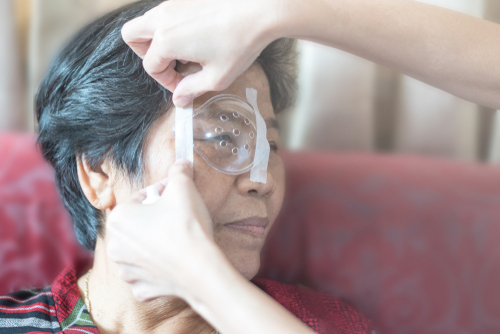What Does Recovery Look Like After Cataract Surgery?
April 10, 2024
Millions of people need cataract surgery every year. Age-related cataracts are incredibly prevalent. There's also no medical treatment that can prevent or cure them.
If cataracts are causing vision issues that interfere with daily life, the only treatment option is having cataract surgery. You may be alarmed or concerned if you hear you need a procedure on your eyes.
However, the good news is that cataract surgery is safe and effective. The procedure is quick, and you can go home after it's over to enjoy your improved vision! Keep reading to learn more about what the recovery from cataract surgery looks like and what to expect from the procedure!
What is Cataract Surgery?
Cataract surgery is a procedure to remove the clouded natural lens of your eye and replace it with an intraocular lens, called an IOL. The procedure takes about 30 minutes.
You'll be awake during cataract surgery, and because it's an outpatient procedure, you'll go home after it's over. During the procedure, your cataract surgeon will start by numbing your eyes.
They may also offer medication to help you relax if you're anxious or nervous. After that, your cataract surgeon will create a small incision in your eye.
They will then remove your natural lens. After removing the natural lens, your cataract surgeon will place your IOL in the pouch where the natural lens used to be. The incision will heal itself without stitches.
Recovering from Cataract Surgery
Once cataract surgery at Metropolitan Ophthalmology Associates is complete, your cataract surgeon will monitor you to ensure no unusual swelling. If you look as you should to your surgeon, you can go home.
You cannot drive yourself home after cataract surgery, so make sure you have a friend or family member who can drive you home. After that, you can go home.
 You'll be required to wear an eye shield for the rest of the day after cataract surgery. You'll need to continue wearing this eye shield overnight for several days after your procedure.
You'll be required to wear an eye shield for the rest of the day after cataract surgery. You'll need to continue wearing this eye shield overnight for several days after your procedure.
The eye shield prevents you from touching or rubbing your eye. You will also get prescription eye drops that you must use as directed.
You may need to use these eye drops several times per day. Many patients find it helpful to set a timer on their phone to remind them to do this.
You can take over-the-counter pain medicine like ibuprofen or acetaminophen to relieve any discomfort you may experience after your procedure. During your recovery from cataract surgery, you will need to avoid certain activities, including:
- Driving
- Swimming
- Exercise
- Bending over
- Lifting heavy objects
- Touching or rubbing your eye
- Wearing eye makeup
After cataract surgery, you can read, watch TV, and use a computer. However, you should take a break if your eyes feel tired or strained.
You should wear sunglasses outdoors to protect your eyes from glare. You can bathe or shower normally, but avoid getting soap or shampoo in your eye.
Your eye doctor will want to see you the day after cataract surgery at Metropolitan Ophthalmology Associates to see how your recovery is progressing. After this first appointment, they will tell you when you can start returning to activities like driving, exercising, or working.
Ready for cataract surgery?
Find out if you’re a candidate.
Side Effects from Cataract Surgery
You may notice some discomfort in the first few days after your procedure. Some discomfort is normal and should gradually improve over several days. You might notice symptoms such as:
- Redness
- Soreness
- Grittiness
- Watery eye
- Blurry vision
- Double vision
If you wear glasses, your prescription may seem wrong for the eye you had cataract surgery. This is normal.
Your glasses or contacts were correcting vision affected by the cataract, which is no longer there. In addition, you now have an IOL that provides vision correction, changing your need for glasses.
You can get new glasses after your eye has healed completely, about six to eight weeks after having cataract surgery.
When to Call Your Eye Doctor
With any surgical procedure, there is a risk of more serious side effects, including infection. You should call your eye doctor right away if you experience symptoms of infection, such as:
- Increasing eye pain or redness
- Discharge or crusting around your eye
- Worsening vision
- Eye floaters or flashes in your field of vision
There is a small risk of additional complications, including:
- Bleeding or swelling in the eye
- Ongoing eye pain
- Blurred vision or vision loss
- Glare, halos, and shadows
- IOL displacement
- Retinal detachment
Some people develop a condition called posterior capsular opacification (PCO), where the pouch that holds the lens becomes cloudy. Sometimes, people call this condition secondary cataracts. Your eye doctor can fix this issue by using a laser to make a tiny opening in the tissue around the lens. It takes less than 5 minutes, and results are immediate.
Call your eye doctor if you have any concerns about post-surgical complications, as most complications can be treated.
Learn More About Cataract Surgery
Schedule a Cataract Surgery Consultation
Cataract Surgery Results
 Most people notice improvements in their vision almost immediately after cataract surgery. Once your clouded lens is replaced with an IOL, you should no longer experience visual problems due to cataracts. You may find that colors look brighter, and you no longer have blurry or blank spots in your vision.
Most people notice improvements in their vision almost immediately after cataract surgery. Once your clouded lens is replaced with an IOL, you should no longer experience visual problems due to cataracts. You may find that colors look brighter, and you no longer have blurry or blank spots in your vision.
You'll also notice gradual vision improvements due to the IOL you choose. As your eye fully heals, your vision will become sharper and clearer.
Your eye doctor will have you in for a follow-up appointment to monitor your healing and visual progress. If you have cataracts in both eyes, you'll have the second eye performed once healing finishes on the first one.
Do you have questions about cataract surgery? Request your appointment at Metropolitan Ophthalmology in McLean, VA, and Chevy Chase, MD, to learn more! Isn't it time to open your eyes to the possibilities of better vision?



